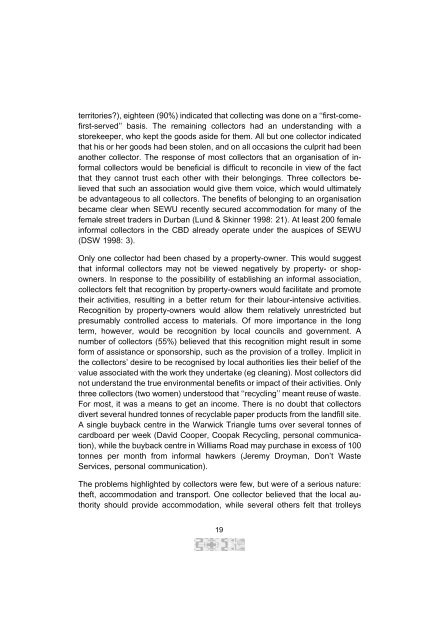AFRICANUS Vol 30 No 2 ISSN 0304-615X - University of South Africa
AFRICANUS Vol 30 No 2 ISSN 0304-615X - University of South Africa
AFRICANUS Vol 30 No 2 ISSN 0304-615X - University of South Africa
You also want an ePaper? Increase the reach of your titles
YUMPU automatically turns print PDFs into web optimized ePapers that Google loves.
territories?), eighteen (90%) indicated that collecting was done on a ``first-comefirst-served''<br />
basis. The remaining collectors had an understanding with a<br />
storekeeper, who kept the goods aside for them. All but one collector indicated<br />
that his or her goods had been stolen, and on all occasions the culprit had been<br />
another collector. The response <strong>of</strong> most collectors that an organisation <strong>of</strong> informal<br />
collectors would be beneficial is difficult to reconcile in view <strong>of</strong> the fact<br />
that they cannot trust each other with their belongings. Three collectors believed<br />
that such an association would give them voice, which would ultimately<br />
be advantageous to all collectors. The benefits <strong>of</strong> belonging to an organisation<br />
became clear when SEWU recently secured accommodation for many <strong>of</strong> the<br />
female street traders in Durban (Lund & Skinner 1998: 21). At least 200 female<br />
informal collectors in the CBD already operate under the auspices <strong>of</strong> SEWU<br />
(DSW 1998: 3).<br />
Only one collector had been chased by a property-owner. This would suggest<br />
that informal collectors may not be viewed negatively by property- or shopowners.<br />
In response to the possibility <strong>of</strong> establishing an informal association,<br />
collectors felt that recognition by property-owners would facilitate and promote<br />
their activities, resulting in a better return for their labour-intensive activities.<br />
Recognition by property-owners would allow them relatively unrestricted but<br />
presumably controlled access to materials. Of more importance in the long<br />
term, however, would be recognition by local councils and government. A<br />
number <strong>of</strong> collectors (55%) believed that this recognition might result in some<br />
form <strong>of</strong> assistance or sponsorship, such as the provision <strong>of</strong> a trolley. Implicit in<br />
the collectors' desire to be recognised by local authorities lies their belief <strong>of</strong> the<br />
value associated with the work they undertake (eg cleaning). Most collectors did<br />
not understand the true environmental benefits or impact <strong>of</strong> their activities. Only<br />
three collectors (two women) understood that ``recycling'' meant reuse <strong>of</strong> waste.<br />
For most, it was a means to get an income. There is no doubt that collectors<br />
divert several hundred tonnes <strong>of</strong> recyclable paper products from the landfill site.<br />
A single buyback centre in the Warwick Triangle turns over several tonnes <strong>of</strong><br />
cardboard per week (David Cooper, Coopak Recycling, personal communication),<br />
while the buyback centre in Williams Road may purchase in excess <strong>of</strong> 100<br />
tonnes per month from informal hawkers (Jeremy Droyman, Don't Waste<br />
Services, personal communication).<br />
The problems highlighted by collectors were few, but were <strong>of</strong> a serious nature:<br />
theft, accommodation and transport. One collector believed that the local authority<br />
should provide accommodation, while several others felt that trolleys<br />
19
















